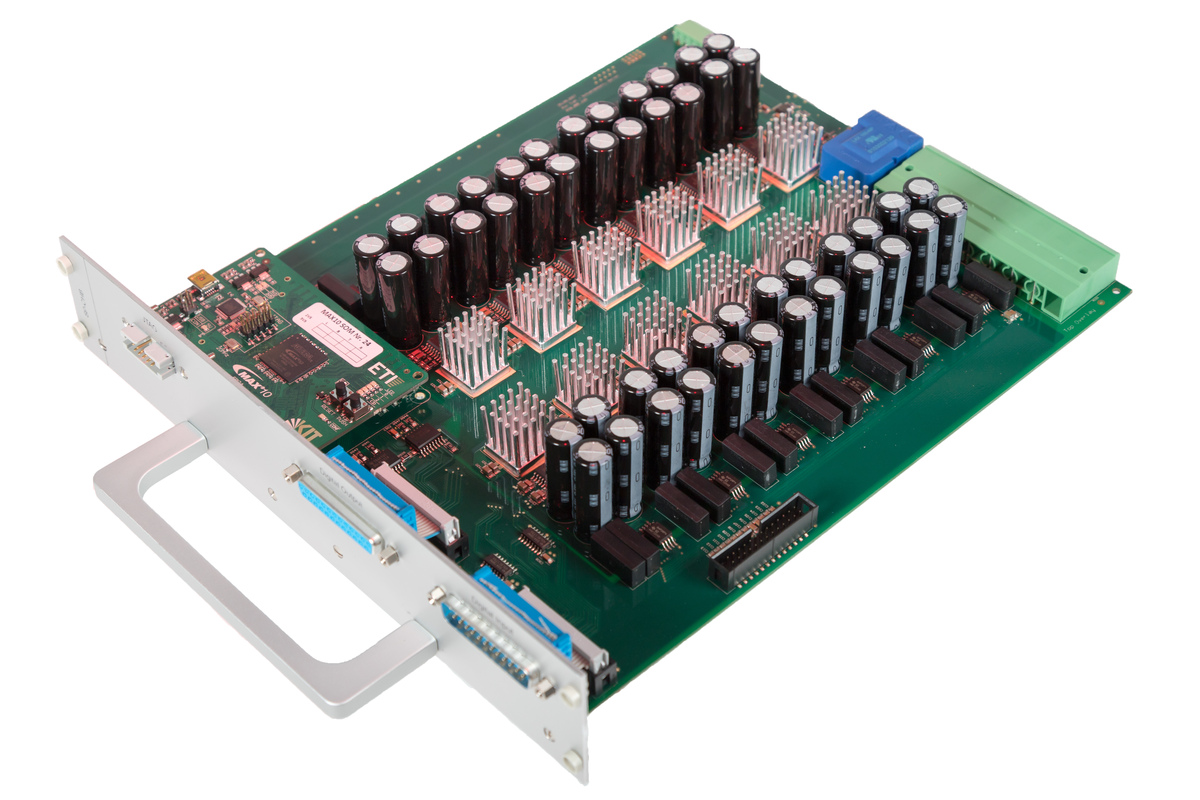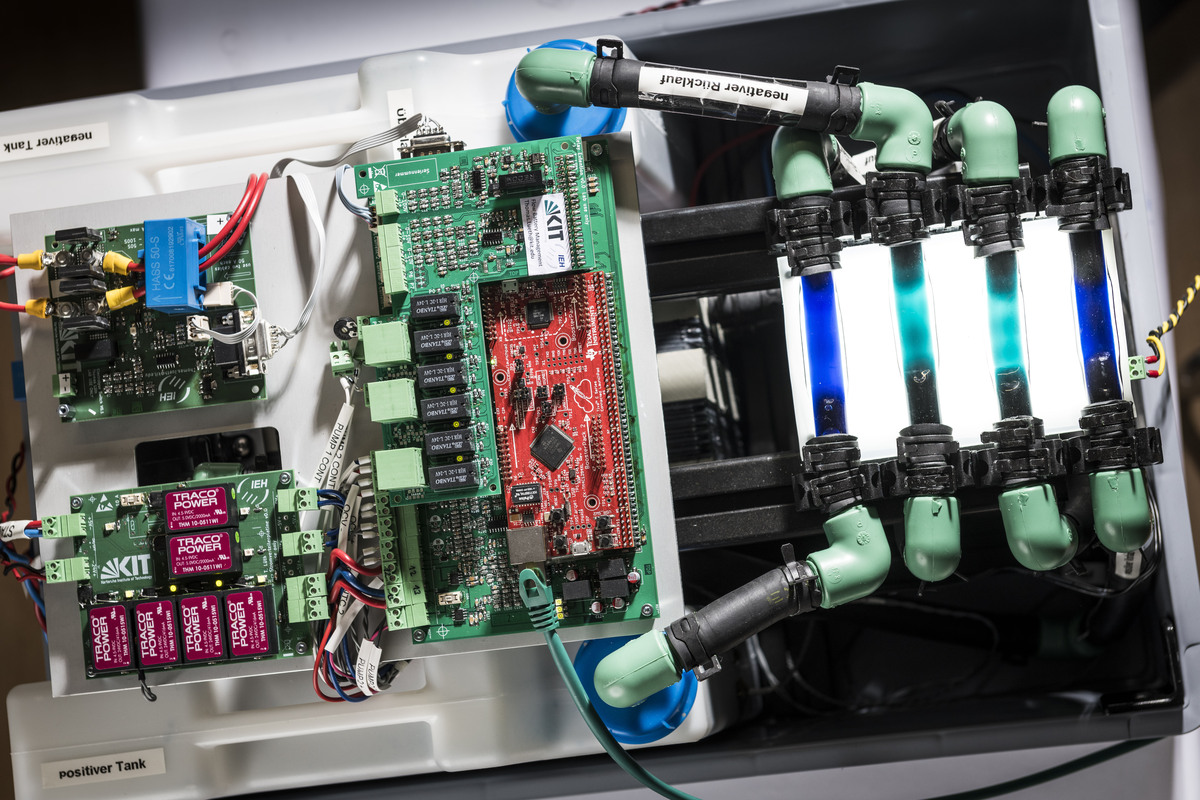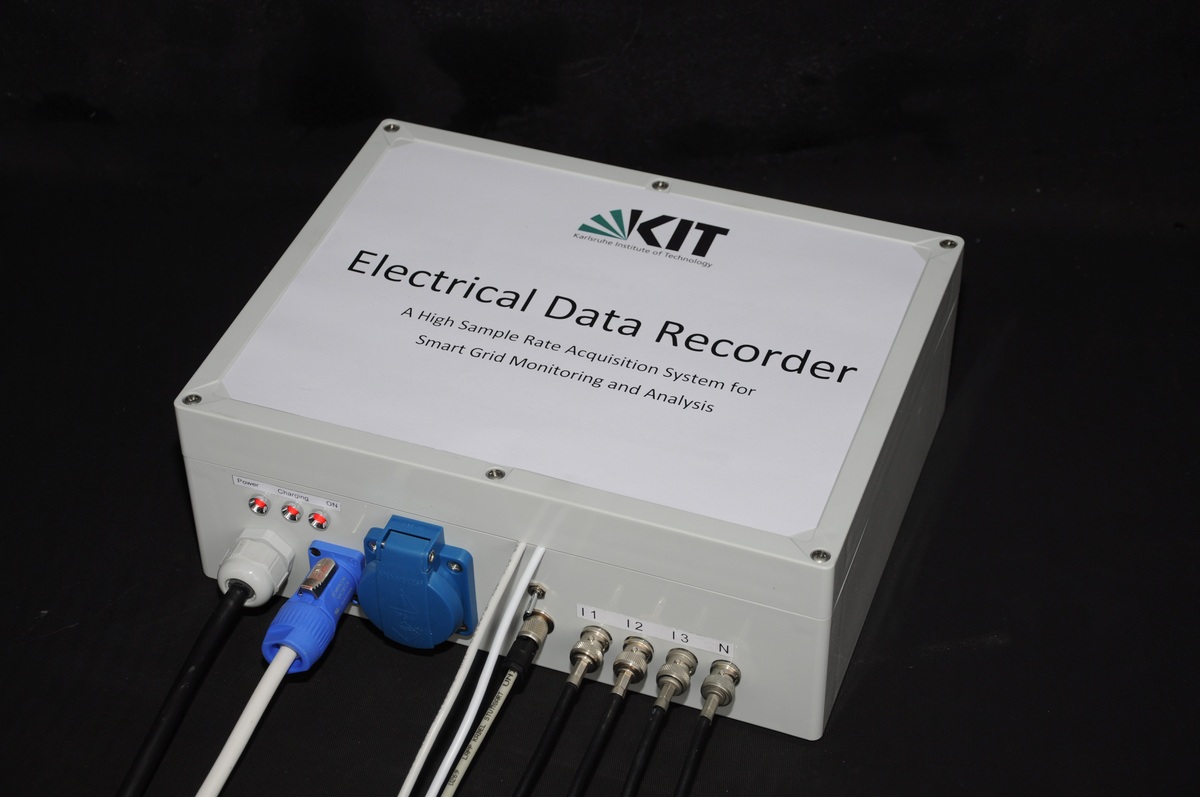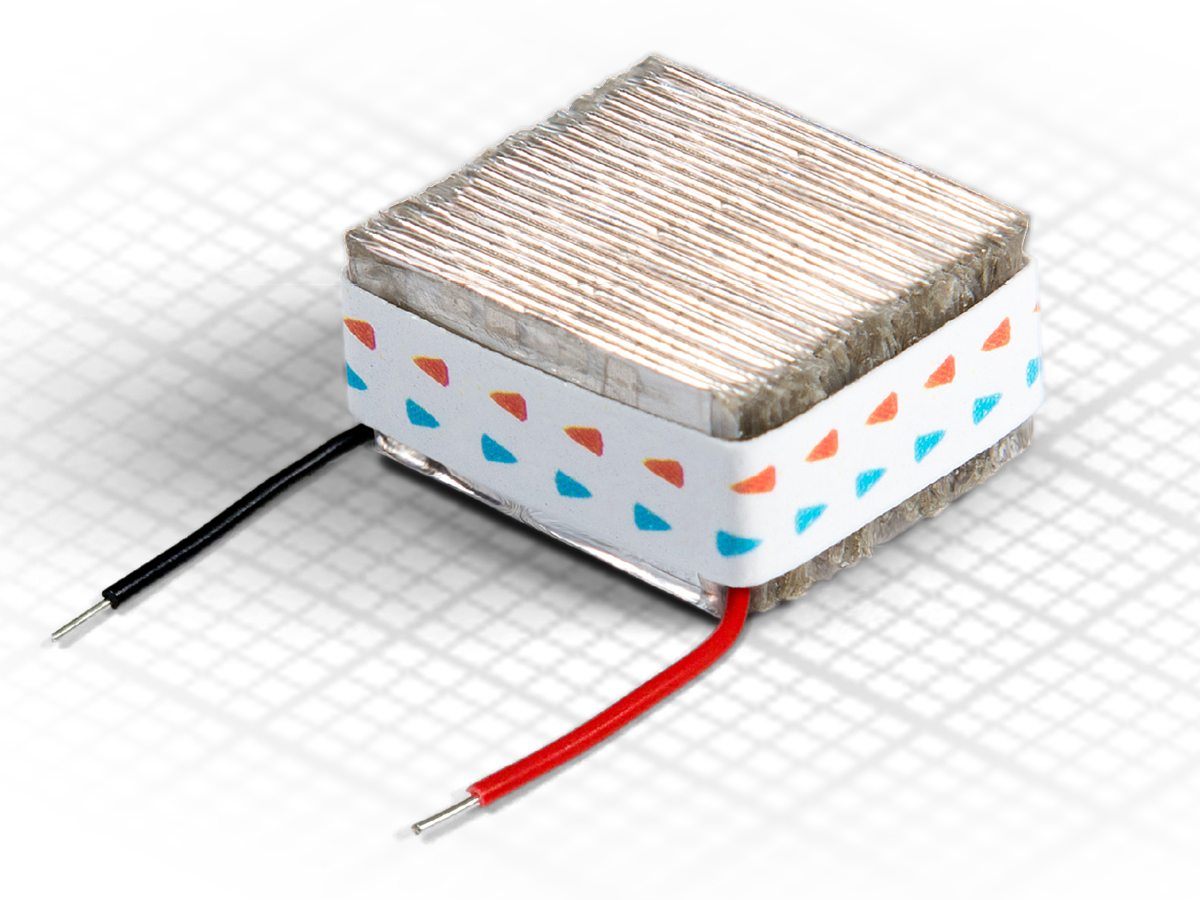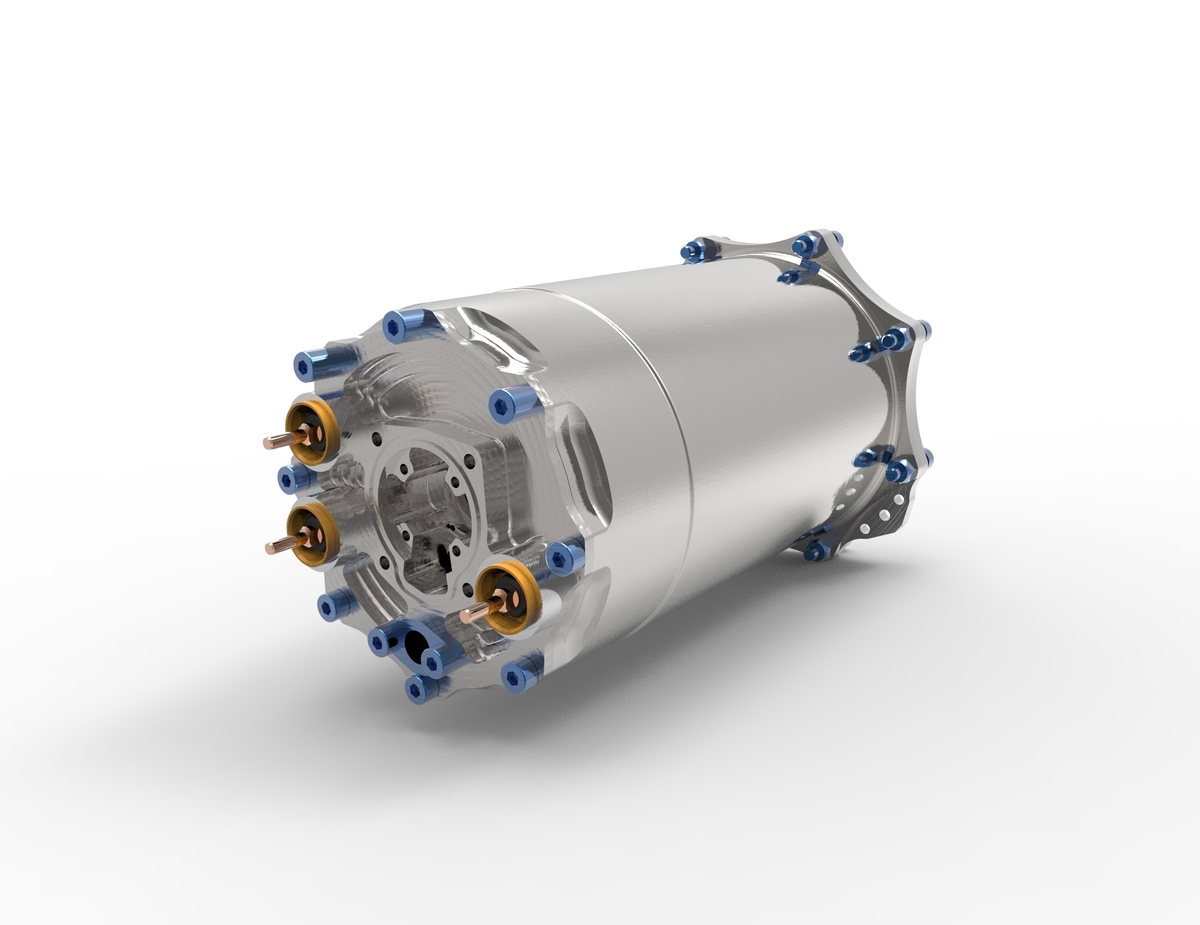PHiL: Flexible Test Field for Future Power Electronics
The energy transition requires the development of new grid structures. The generation of energy from renewable sources and use of this energy in high-consumption applications, such as electromobility, will only be possible with power electronics frequency converters. By the high-precision adjustment of voltages and currents, they supply energy in a safe and tailored manner. For early-stage testing of newly developed frequency converters under real operating conditions, scientists of KIT develop a Power-Hardware-in-the-Loop system (PHiL). As a test environment, it enables reliable simulation of the electrical power grid and all fault cases occurring in it. Continuous improvement of the hardware and software of this test lab allows flexible adaptation and adjustment of all components of the complete system.
Further Information
Redox Flow Batteries: Reliable Storage for Renewable Energy
The energy transition needs technical solutions for the decentralized storage of energy from solar and wind power and the compensation of fluctuating production capacities. Apart from the established lithium-ion technology, the redox flow battery offers an innovative solution: It stores electric energy in liquid chemical compounds. The flow battery has a number of advantages that make it particularly suited for medium to large storage projects: Thus, power (kW) and energy (kWh) can be scaled independently of each other. A simple example of an application is the “shifting” of solar energy into the night. Scientists of KIT study options to reduce the costs and make the flow battery technology more reliable. So far, every battery installed had to be adapted manually to a specific application scenario. With the new control system developed by KIT, entire battery clusters can be managed decentrally. Hence, battery modules can be prefabricated and only need to be connected at the installation site.
Further Information
EDR: Monitoring and Analysis Tool for Electrical Power Grids
As the energy transition progresses, the number of consumers simultaneously power from wind and solar energy on a decentralized level is growing. They replace increasing fractions of production capacity, but hardly serve the grid, as they neither fulfill tasks like voltage stabilization nor provide control energy. In future, smart grids are to fulfill these tasks. Their design and control are based on precise system models and high-resolution measurement data from ongoing grid operation. For this purpose, lectrical engineers of KIT have developed an Electrical Data Recorder (EDR). When installed in the grid near the end consumer or in industrial facilities, the EDR can precisely measure grid voltage and load currents. The EDR, together with data-driven modeling of grid segments and operating resources, will considerably improve the quality of system models and, hence, future control of a smart grid.
Further Information
Startup otego: Microenergy Supply without Battery or Cable
For applications on the Internet of things and in Industry 4.0, thermoelectric generators may offer a good alternative for smallest autonomous consumers: Instead of extracting electric power from battery storage systems or cables, the microgenerators made by KIT’s startup otego GmbH directly produce electric power from surrounding heat sources and, thus, ensure continuous supply. This reduces the maintenance expenditure and the saves resources. Heavy metals, such as tellurium, are not needed at all. Their compact design, the absence of mechanically moving parts, and the use of plastics as base materials make the microgenerators highly robust and reliable. The energy thus supplied can be used to operate a wide variety of sensors, measurement electronics, and wireless systems: From simple products, such as an electronic radiator thermostat, to sensor nodes in larger facilities.
On April 23, 12.30 hrs, Frederick Lessmann, one of the otego founders, will speak about “Industrie 4.0 – Wer wird da eigentlich smart gemacht?” (Industry 4.0 – Who is really getting smart?) at the “Forum Young Tech Enterprises” (hall 17, stand A58).
Further Information
Startup SciMo: Innovative Electric Drive Technologies
The intensive further development of electric drives is crucial to electromobility. While compact and high-performance motors are required, impacts on the environment and manufacturing costs have to be reduced as well. These challenges are addressed by SciMo – Elektrische Hochleistungsantriebe GmbH (SciMo – Electric High-performance Motors), a startup of KIT established in 2017. SciMo has already developed several successful motors that helped KIT’s “Ka-RaceIng” team win the “Formula Student Electric 2016” and were used in the prototype of TU München winning the Hyperloop competition of SpaceX 2017, for instance. The motors main characteristics are their small sizes and high power outputs. The compact design is achieved by an elevatedrotational speed level. By means of a downstream gearbox, the rotational speed of the electric motor can be adapted ideally to various drive scenarios. Innovative cooling methods, such as the indirect groove cooling method optimized by SciMo, allow for very high continuous current densities, which increases the performance of the motors. With these properties, they might also be used as generators in future airborne wind power plants.
Further Information
Technology Market Platform
RESEARCH TO BUSINESS, the technology market platform of KIT, presents another 30 technology offerings at KIT’s Energy stand. These offerings cover KIT’s innovations which might be translated into marketable products and processes.
ENSURE at Hannover Messe
The ENSURE consortium coordinated by KIT and funded by the Federal Government as one of four Kopernikus projects for the energy transition will also be present at Hannover Messe on Thursday, April 26, 2018. Then, Rik W. De Doncker (RWTH Aachen) will be available to answer questions in the walk-in showroom of the “Integrated Energy Plaza.” In addition, Sascha Altschäffl (TenneT) will speak about ENSURE at the forum “Life needs Power” from 12.30 to 13.00 hrs.

